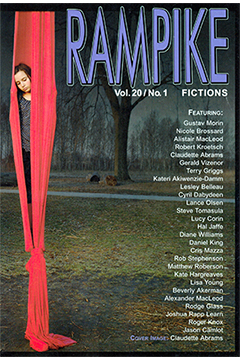 English professor Karl Jirgens has seen the Leddy Library create a digital archive of his literary magazine Rampike.
English professor Karl Jirgens has seen the Leddy Library create a digital archive of his literary magazine Rampike.
It’s been 40 years since the first issue of Rampike, a cutting-edge literary magazine, rolled out from the basement of Rivercrest Road near the Humber River, in Toronto’s west end.
In 1979, its unique format — 18 inches tall and 6 inches wide — stood out against other publications. It was available on five continents, and now, all 24 volumes are accessible anywhere with an internet connection.
“I was one of Marshall McLuhan’s last students and understood that ‘the medium is the message’,” said the magazine’s founder and editor, Karl Jirgens, a professor of English and creative writing. “In designing the magazine, I wanted it to stand out and make a statement about print-culture. With the archive, I ensured that all copyrights remained with contributing artists and writers.”
The journal certainly stood out. Within five years of its inception, Rampike gained international recognition, and contributors were sending in materials from around the globe.
 The complete Rampike series, more than 4,000 pages dating from 1979 to 2016, is now available in an online archive provided by the Leddy Library’s Centre for Digital Scholarship (https://scholar.uwindsor.ca/rampike/about.html ). If you can’t remember the e-address, then just google “about Rampike,” click the “university” button and you’re in. In addition, Rampike’s print archive will be housed in the Fisher Rare Books Library at the University of Toronto.
The complete Rampike series, more than 4,000 pages dating from 1979 to 2016, is now available in an online archive provided by the Leddy Library’s Centre for Digital Scholarship (https://scholar.uwindsor.ca/rampike/about.html ). If you can’t remember the e-address, then just google “about Rampike,” click the “university” button and you’re in. In addition, Rampike’s print archive will be housed in the Fisher Rare Books Library at the University of Toronto.
Dr. Jirgens, touted as a talent scout, founded the magazine to help launch a fresh generation of authors and artists alongside those with established careers. Throughout its 36-year run, Rampike featured prize-winning and ground-breaking international writers, artists, and theorists including Paul Auster, Iain Baxter&, George Elliott Clarke, Jacques Derrida, Susan Gold, Phil Hall, Tomson Highway, Linda Hutcheon, Thomas King, Julia Kristeva, Alistair MacLeod, Eugene McNamara, Norval Morrisseau, NourbeSe Philip, Brenda Pelkey, Nino Ricci, Anne Waldman, David Foster Wallace, and many others.
Among its contributors were UWindsor faculty and alumni, as well as such Windsor talents as Marty Gervais, Lucy Howe, Mark Laliberte, Zeke Moores, and Gustave Morin. Its record of diverse and vibrant local research-culture made Rampike a prime candidate for archival digitization at the Leddy Library.
The library built a team with collective knowledge ranging from archival concerns, systems expertise, scanning, and long-term digital preservation to organize files, develop metadata, and create the website where the publication is now preserved for future generations.
“Over the years I’ve learned that editors have to adapt quickly to changing technologies and mediums. I’m extremely grateful to team Leddy!” said Jirgens. “Sharing the entire collection online through the digital archive enhances accessibility and generates a second life for Rampike, and it’s already drawing a lot of interest from new readers and scholars.”
The Rampike archive took roughly six years to complete. Jirgens thanks the library’s experts, including Heidi Jacobs, Dave Johnston, and Marg McCaffery-Piche.
“Digital culture is increasingly important during this pandemic,” said Jirgens. “Sharing resources online builds collegiality between UWindsor and global students and scholars.”
A symposium to celebrate the digital archive, originally scheduled for spring 2021, has been postponed until the pandemic recedes. More news will follow about the symposium when safety is restored. In the meantime, the entire print-run of Rampike is available free online.
